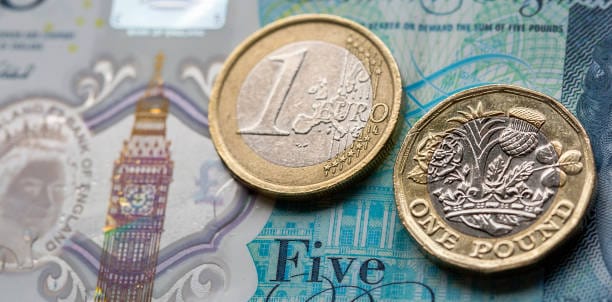GBP/EUR exchange rate week review: pound traverses 1.18 range versus euro
The pound euro (GBP/EUR) exchange rate meandered through a narrow range ahead of the UK and French elections.

(24/06/2024 to 28/06/2024)
Monday
The pound euro (GBP/EUR) exchange rate was flat at around 1.181 following the release of data showing German business confidence faltered in June.
According to the Ifo institute’s German business sentiment index, morale unexpectedly fell as the Eurozone’s largest economy struggles to overcome stagnation.
This compounded the uncertain political landscape in France where Marine Le Pen’s far-right party has emerged as the favourite to win the upcoming election.
Tuesday
The pound remained rangebound versus the euro amid a lack of market-moving data from the UK or the Eurozone.
In the absence of notable figures other political economic variables came into sharp focus for investors, posing several questions: Will Labour win the upcoming UK election and boost the pound? When will the Bank of England’s (BoE) first interest rate cut be actioned? Will French President Emmanuel Macron’s gamble to call a snap election pay off or will Marine Le Pen prevail?
Wednesday
The pound continued to tread water following the publication of the CBI’s monthly retail sales balance, which showed volumes fell faster than anticipated in the year to June, reversing a return to modest growth in May.
This was offset by renewed signs of German economic pessimism after the GfK Consumer Climate Indicator unexpectedly declined in July.
Contact a currency specialist to discover how they can help you take control of exchange rates.
Thursday
The pound euro rate continued to trade in a narrow range following the release of the Eurozone’s economic sentiment index for June, which reported that morale declined marginally in June.
With movement in the single currency limited, investor attention turned to concerns over the strength of the UK labour market and threats to the UK’s financial system – both of which left the UK currency struggling to garner support.
The latest update from global hiring company Indeed revealed that the UK labour market is cooling.
The BoE’s financial stability report warned that uncertainty caused by elections globally, starting this weekend in France, risks destabilising the UK’s financial system.
Friday
The pound initially trended higher after it was reported the UK economy grew at a faster pace than anticipated during the first quarter and the euro was pressured by rising German unemployment.
The UK economy emerged from recession at a faster pace than previously projected in the first three months of the year, after GDP fell for two quarters in a row in the second half of 2023.
GDP expanded by 0.7% from the fourth quarter last year, above an initial estimate of 0.6% growth.
The pair then dipped below the 1.18 benchmark following the latest US inflation print.
The personal consumption expenditures index, the Federal Reserve’s preferred measure of inflation, cooled from 2.7% to 2.6%, confirming that price pressures in the US are easing towards the central bank’s 2% target. This stoked speculation that the Fed could begin to unwind its monetary policy sooner than previously anticipated.
The under-pressure dollar supported the euro, due to the currency pairing’s negative trading correlation.
The pound euro exchange rate ended the week a fraction above the 1.18 level.
Looking ahead
After six weeks of political jousting, the UK general election takes place on Thursday. With Labour streets ahead of the Conservatives in the opinion polls, the odds of a win for Kier Starmer’s opposition party are likely already baked into the pound, potentially limiting drastic market movement.
Markets are continuing to debate French political uncertainty ahead of the first round of parliamentary elections this weekend, amid the prospect of a National Rally party victory and parliamentary gridlock.
German and Eurozone consumer price figures hit the headlines on Monday and Tuesday respectively. Any signs of cooling inflation could encourage the European Central Bank to cut rates further having pledged to apply a data-driven approach to future decisions.
